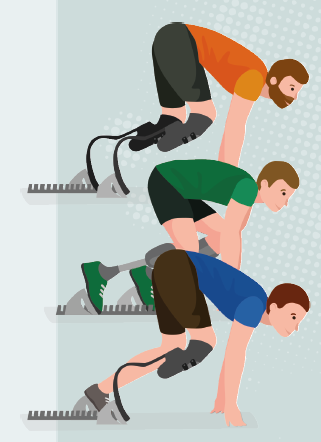Paralympics Athletes’ Least Favourite Word: Inspiration
They hear the word on commercials advertising the Paralympic Games. They see it on promotional material. It surfaces in encounters on the street, in the grocery store, and during interviews.
The word is inspiration, and it tends to annoy and frustrate many of the athletes to whom it is so regularly applied. Often, it produces the opposite of the intended effect. It takes away the focus away from athletes’ accomplishments because it highlights their disabilities, branding them as different.
“It’s not a word that we like to hear,” said the Team U.S.A. swimmer Jessica Long, who has won 23 medals across four Paralympics after having both her legs amputated below the knee at the age of 18 months. “I’m just doing what I do. I’ve been a bilateral amputee since birth and don’t know anything else. I’m not just going to stay in my house and hide.”
Many of Long’s peers share her perspective. Although interest in the Paralympics has increased, those within the para-athlete community are constantly fighting for exposure and equality — and fighting to raise awareness for an event that, they said, still gets mistaken for the Special Olympics.
They argue that they are fundamentally no different from the Olympians who take part in the same races. Both Olympians and Paralympians participated in a rigorous international competition that demands not only years of dedication but excellence.
“I know people can see me and think, Wow, she’s not shy, she can live her life and walk without any problems,” said Martina Caironi, an Italian sprinter and long jumper who lost a leg after a motorcycle accident in 2007. “And that’s good, but I think — I don’t go in the street and stop someone and say, ‘You have beautiful hair.’ To me, it’s quite the same.”
Vincenzo Boni, an Italian swimmer also added, “The stupidity of human beings is to judge someone. We’re athletes who are like the normal Olympians.”
Kody Puderbaugh, who plays wheelchair rugby for the United States, has adopted a different strategy for when he is called an inspiration. He will ask the person who called him inspirational how they intend to inspire someone else.
“I think if people understood a little more about what it’s like to be in our position, they wouldn’t necessarily pick the word inspiration,” said Puderbaugh, a former wrestler who was born without his lower legs, part of his left arm and most of his right hand. “I think they’d probably say, ‘Wow.’ Or ‘Amazing.’”

